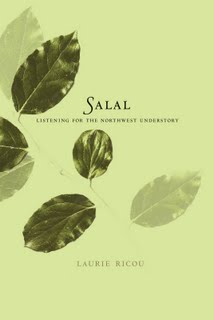 Title: Salal: Listening for the Northwest Understory
Title: Salal: Listening for the Northwest Understory
Author: Laurie Ricou
Genre: Nonfiction
Year: 2007
Acquired: Free from publisher for review
Rating: 




One Sentence Summary: Salal is a travel story and literary exploration of a common plant that often gets ignored.
One Sentence Review: The book is a little hard to get in to, but ends up being a readable journey about how a single plant can help illuminate the history and culture of a region.
 This review is part of the Green Books campaign. Today 100 bloggers are reviewing 100 great books printed in an environmentally friendly way. The goal is to encourage publishers to get greener and readers to take the environment into consideration when purchasing books. This campaign is organized by Eco-Libris, a a green company working to green up the book industry by promoting the adoption of green practices, balancing out books by planting trees, and supporting green books. A full list of participating blogs and links to their reviews is available on Eco-Libris website.
This review is part of the Green Books campaign. Today 100 bloggers are reviewing 100 great books printed in an environmentally friendly way. The goal is to encourage publishers to get greener and readers to take the environment into consideration when purchasing books. This campaign is organized by Eco-Libris, a a green company working to green up the book industry by promoting the adoption of green practices, balancing out books by planting trees, and supporting green books. A full list of participating blogs and links to their reviews is available on Eco-Libris website.
This book was printed on recycled paper by NeWest Press.
Long Review: It took me a really long time to figure out how to describe this book. In fact, as I sat down to start the review I still wasn’t sure how to explain because the book a hybrid of many kinds of books. But as I was flipping through the author’s acknowledgments I found this description:
some hybrid text imagined as a horticultural-literary ethnography
That’s a nearly perfect way to describe this book, which is unlike most other books I’ve read lately.
The author is an English professor at the University of British Columbia who described his quest in writing the book as a journey to see where exploring the idea of salal, common plant found in the understory of many forests in the Pacific Northwest, might lead him and whether, using as many references to the plant as he could, if he could gather a story about regional culture.
I was both excited and skeptical of his premise. On the one hand, I’m developing a personal philosophy that anything, no matter how insignificant, can be made interesting if you have a good storyteller. What better way to test the theory than on a book about a plant I wasn’t sure I’d ever even seen?
But the author’s description in the introduction of his reporting style had me a little worried. Ricou explained that his method to write the book was mostly to find as many allusions to salal as he could and compile them. He also noted that he “resisted” using conventional structure to frame the book because he wanted to show the endless interconnectedness of salal to everything around it.
That plan seemed like it could work, or it could end up with a book that had no idea where it was going.
The book fell somewhere in the middle for me. After I got into it, I started to not mind the meandering nature of the story and started to just appreciate the moments when there was an unexpected anecdote or use for salal that I recognized. There might have been a better way to tell the story, one that would have given the book a straighter path, but the meandering walk worked pretty well too.
My favorite parts were the sections Ricou spent exploring literary and cultural references to salal. Even if I didn’t know the book or work, his explanations were clear and his analysis was insightful. The literary references felt like Ricou was just sitting down and chatting about a poem with the reader — a tone that works well.
I wasn’t as impressed with his choice of how to use his interviews. In the introduction Ricou said he decided early on that “the salal-tellers should ‘talk’ with a minimum of mediation. I wanted the voices to be heard in their own distinctiveness.” While I appreciate that sentiment, I didn’t think it was a great choice for the book. Voice can be accomplished even with editing from an author, so I wish Ricou would trimmed and edited rather than using quotes that were sometimes three or four pages long. When the interviews rambled, it let a book already threatening to get lost meander even further off the narrative path.
That said, I enjoyed reading this book, both for the information and for the form it tried to use. Sometimes I get so bogged down in writing that uses consistent storytelling outlines and techniques that it’s jarring to pick up something new. I appreciated that this book tried something different, even if it didn’t always work exactly as expected.

Comments on this entry are closed.
Wow! I think that book might be over my head. Glad you were able to enjoy it.
Kathy: I don’t think it’s too complicated to be not understood, it’s just sort of different. If the topic seemed interesting to you, I think you should try it.
I grew up in an area where salal was all over the place- so for that alone this book might interest me. (Incidentally, it was mentioned in a book I read recently, The Egg and I. Was that one mentioned in the chapter on literary references?) But it sounds like a rough one to read, so I’m still feeling doubtful per your review.
Jeane: I don’t think “rough” is the word I’d use to describe the reading experience. The book isn’t difficult to read, it just took a little bit to get into and left me with a feeling like I wanted to think about it more. I’d at least give it a try if the topic seems interesting to you (and make sure you read past the introduction, it gets better once you get into it).
You must like to solve puzzles – this DOES look like a hard book to review!
I’ve read a lot about invasive plants, which this book reminds me of. Not to say that salal is invasive, I’m just making the connection to how plants can affect the area they’re in.
I’m enjoying the variety of reviews posted today for the Eco Libris campaign.
Dawn: I like some puzzles, mostly puzzles of trying to figure out symbolism and stuff in books… I’m terrible with crosswords and stuff like that! And yeah, I’m sure there would be interesting connections to books on other plants. I don’t read a lot of books on that topic, so it’d be hard for me to compare.
Despite the tough time you had getting into this book, it sounds like a book that I would enjoy. I’ve been loving these reviews for the green books campaign.
Serena: Yay, I’m glad the review didn’t turn someone off 🙂 I thought it was an interesting book, although no exactly what I expected… but I feel like that with a lot of books!
I thrive on being contrary. I tend to like books that others find difficult or unpalatable.
I’ve never heard of salal, which is what makes the book sound interesting to me, but I still don’t think I could read it. Thanks for the review.
Anna: I’d never heard of it either, which I think made it harder to read since I didn’t have a clear picture or idea of what he was writing about to start with. I might have better understood a book about a native Minnesota or Wisconsin plant, since the cultural significance would be more immediate for me.
I’ve never heard of salal either. Did you think he could pull together a story about a regional culture from following one plant?
Jodie: I think he got quite a bit of the culture, or at least the culture connected to salal. He talked to people who pick it, who ship it, who use it in products, who study it, and who just enjoy it. So you get a sense of how many ways the plant impacts people and the reach a single thing can have. I’m not sure if he got the culture of the entire Pacific Northwest but it was a pretty through attempt.
I am glad you ended up liking this in the end!
Kaliana: Me too! I like when books turn and you get done feeling glad you read it.
Good to know! Sorry I misunderstood your take on the book. I have found that usually I like reading introductions after the rest of the book, sometimes they put me off or give too much away. Apparently it’s a good strategy in this case.
Jeane: No problem, I’m glad I was able to explain a little better. This book was funny in that I got to the end and actually wanted to read the intro over, even though on my initial reading the intro annoyed me. It was nice to go back and see the author’s thoughts on what the book was trying to do after I’d had a chance to read it myself and decide on those things.